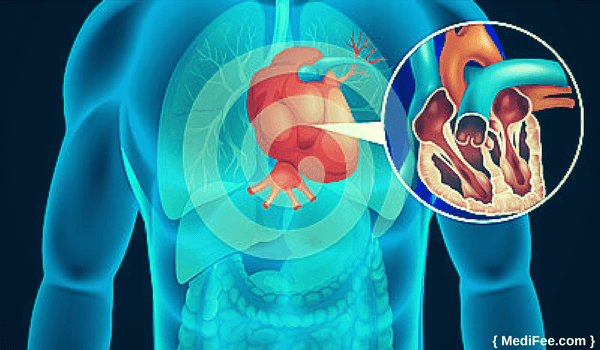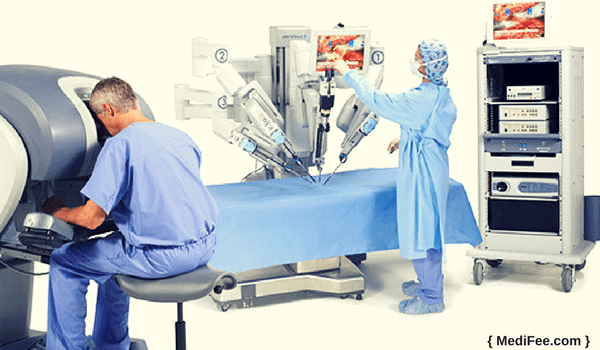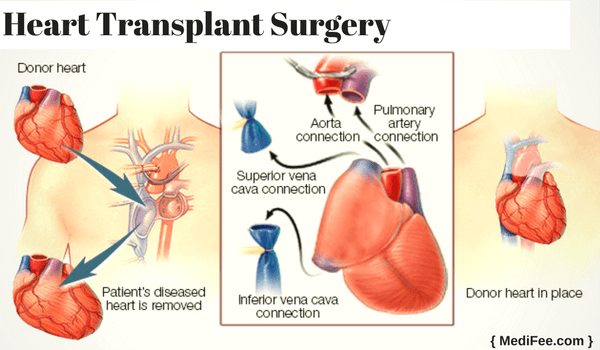Heart Cancer Surgery
Listed below is the step by step procedure of heart cancer surgery:
- What is Heart Cancer Surgery?
- Why is Heart Cancer Surgery Required?
- Pre-operative Preparations
- Day Before Surgery
- Procedure Day
- Methods/Techniques of Heart Cancer Surgery
- Post Procedure
- Risks and Complications
What is Heart Cancer Surgery?
A heart cancer surgery involves removal of a part of the heart's muscular tissues in order to diagnose, examine and treat heart cancer. Sometimes, you also require a heart transplant to discard heart cancer. Surgical methods may vary according to the type, extent and other related aspects of heart cancer.
Heart cancer surgery is mainly performed for two purposes; to remove cardiac tumors and to remove cells, tissues or muscles of your heart affected with cancer.
Heart cancer is very rare. It is mainly distinguished in two types: primary heart cancer and secondary heart cancer. Based on these types, surgical methods are adopted for treatment.
Why is Heart Cancer Surgery Required?
For heart cancer conditions, the options for treatments are limited. If there is a presence of cancerous cardiac tumors within your body, purification of blood in your system gets disturbed. This results in increased impurities in your blood. Also, there is a great impact on the pumping mechanism of your heart. This affects the other functionalities of the heart as well, reducing the chances of one's survival. Heart cancer surgery helps to completely discard such type of tumors from your body.

Heart cancer surgery is more often performed when the cardiac tumor is diagnosed as type benign (tender). If the tumor is situated in the left atrium, it can be easily removed with the help of surgery. But as it grows, it can block the blood from circulating into the chambers of your heart. This could even lead to heart strokes. Before any such incidence occurs, a heart cancer surgery is very essential to remove these tumors in time or else the stroke can turn severe and can also be life-threatening.
Pre-operative Preparation
Pre-operative preparation is very important part that every patient as well as doctor should follow in order to treat heart cancer in an efficient manner. This preparation period involves certain tests that are mandatory for the heart cancer surgery.
General Examination
A general examination is a must before moving forward to any treatment measure for your heart cancer. Along with general examination, your cardiologist will also learn about your medical history. If you have a low or high blood pressure, it is very important to share it with your cardiologist.
Blood Tests
There are so many types of blood tests that identify the type of cancer. Mainly blood tests can be conducted in order to learn whether the heart cancer is primary or secondary. Blood tests can also include:
- Tumor Marker Test:
Tumors make certain chemical substances called as tumor markers that are present in your blood. Hence, this test is conducted to find such chemicals in your blood samples. Tests can be conducted to check for cancerous tumor markers. Before a surgery, it is very important for your doctor to know about the site of the tumor. Hence, if tumors are detected, further tests can be performed to identify their location.
- Circulating tumor cell test:
Recently introduced blood tests are used to identify cells that are broken off from an original cancer site and are flowing in the bloodstream. This test is known as circulating tumor cell test. It can also serve the same purpose as the above test.
- Blood-serum compatibility test:
If there is a need of heart transplant for patients who have secondary heart cancer, it is very important to undergo a blood-serum compatibility test. To avoid complications of organ rejection or graft (substitute blood vessel or part of tissue) failure, this test is very important for the patient's body. It shows whether the donor's heart is compatible with your body.
- Tumor Marker Test:
Radiology Tests
Various scanning tests are done to get pictures of internal structures of your heart and other parts of your body. These tests include:
- Computer Tomography (CT) Scan:
A CT scan shows a cross-sectional view of different sections of your heart. CT scans can display the size and shape of your tumor. It can also show where the tumor is located. Blood vessels that feed the tumor or cancer cells can also be easily located with this test.
- Magnetic Resonance Imaging (MRI) Scan:
This scanning test helps to find cancerous cells in the body and where they have migrated. MRI scan gives a clear image of cancer that helps the doctor to decide about the suitable surgery method to deal with heart cancer.
- Breast MRI (Magnetic Resonance Imaging):
Breast MRI is a specially designed mechanism that consists of special equipment to scan the breast only. Heart cancer can be easily studied using this mechanism which is needful to decide various aspects for the surgery.
- Position Emission Tomography (PET) Scan:
A PET scan is usually combined with CT scan to notify your doctor about cancer cells. Cancer cells consume large amount of sugar. Hence, in a PET scan, a sugar substance is injected inside the patient's body so that presence of cancer cells can be detected easily. Also, the site of cancer is located.
- Ultrasound:
If your X-rays fail to show tumors within your heart, an ultrasound can be used to detect them
- Computer Tomography (CT) Scan:
Myocardial Biopsy
Myocardial biopsy is the primary diagnosing technique for learning about heart cancer tumors. This technique involves taking tissue samples from the heart with the help of a catheter and cutlery tools. Later. these tissue samples are sent to the pathological laboratory to inspect them under a microscope. This technique is used to identify the following:
- Type of heart cancer
- Location of the tumor
- Stage of the heart cancer
- Extent to which it has spread within the body
Cardiac Catherization
Electrophysiology Test
A cardiac catherization procedure starts with injecting a contrast dye into a thin tube. Using a blood vessel of your leg or arm, this tube is inserted into your body and directed towards your heart. This tube is medically termed as a catheter. Using this catheter, X-ray images of the tumor or cancer site are obtained. The doctor examines these images to study about the location of the tumor and the extent to which cancer has spread throughout your body.
The purpose of a electrophysiology test is to calculate the rate of your heart beat and the electrical activities performed by the passages inside your heart. These two entities are useful to determine the location, size and nature of the tumor present within your heart. It also helps the doctor to learn about the cause of disturbance in your heartbeat rate.
Day Before Surgery
The most important step that is required just a day before your surgery is knowing about the do's and dont's to follow on the surgery day. Your doctor will guide you with all the required details about your dietary measures to follow on the day of surgery. He/she will also explain in brief about the procedure of your surgery and ask you to sign a consent form. Patients will also be informed about other precautionary measures to follow on the surgery day. Timings of the surgery and pre-surgical procedures will also be informed.
Procedure Day
On the day of procedure, make sure you follow all the necessary precautions. Do not drink water for around 4 hours prior to the surgery. Before the surgery begins, your vitals will be checked. Normal vitals indicate that you are ready for the surgery or else you have to wait for the surgery until your vitals become normal.
Sometimes, patients are so scared before a surgery, that they increase their blood pressure. Your team of doctors try to get it to normal so that you can go for the surgery. Similarly your blood sugar level is also checked.
Your body will be sedated for the surgery so that you remain unconscious and do not feel any pain when the surgery is being carried out. Number of incisions made around your chest for the operation depends on the type of surgery being performed.
Methods/Techniques of Heart Cancer Surgery
The method and technique used for your heart cancer surgery depends on various associated aspects of your cancer. For example, stage of cancer, type of tumor, extent to which cancer has spread and most importantly, the type of heart cancer you have. There are different methods to treat primary heart cancer and secondary heart cancer. A primary heart cancer is the cancer that arises inside or around your heart. Whereas, a secondary heart cancer shows that cancer has spread from other parts of the body to your heart. This indicates that cancer is already in its advanced stage.
In primary heart cancer patients, cancerous tumors are present within the chambers of their heart that may require an open heart surgery. However, in most cases, the heart cancer surgery can be performed using a robotic method that involves minimum invasive technique. The main purpose of surgery is to discard the tumors and its surrounding tissue cells in order to reduce the risk of tumor from coming back.
The surgical procedure for a heart cancer is complicated and requires a still heart. Hence, a heart-lung machine is used as a artificial substitute to perform the functions of the lungs and heart temporarily.
Robotically Assisted Heart Cancer Surgery
A robotically assisted heart cancer surgery is mainly used for removal of intracardiac tumors. This surgery uses a minimal invasive approach. The hand of the surgeon controls the placement as well as other movements of an endoscopic (surgical instrument containing a light and camera) instrument within your heart. This is done by making incisions in the left atrium. An endoscope is used to cut and remove the tumors and other cancerous tissues.

The team of surgeons will keep a note of your blood pressure and heart rate right from the beginning to the end of this surgery. Making a note of these parameters is very important. In case there is any severe drop or rise in these parameters, your doctors need to stop the surgery and pay attention in normalizing these parameters first. Immediate medical assistance is required to normalize it. Surgery can be then resumed.
Benefits of Robotically-Assisted Heart Cancer Surgery
Benefits of robotically-assisted heart cancer surgery are as follows:
- Small sized incisions resulting into minimum scarring
- Short span of hospital stay
- Less bleeding
- Faster healing leading to shorter recovery time; patients can resume their daily activities sooner
- Less pain and trauma after the surgery
- Less usage of pain relieving medications
- Lower risks of infections
Heart Transplant Surgery
In secondary heart cancer patients, as discussed earlier, cancer is already in its advanced stage. As a result, cancer will spread rapidly, affecting most parts of your heart valves and tissues. It is very difficult to control and cure cancer in its advanced stage. The best method to deal with such a crucial state of your heart is to go for a heart transplant surgery. As most of the sections of your heart have undergone severe damage, maximum of your heart functions get hampered. At such stages, a heart transplant surgery becomes a necessity.

A heart transplant procedure begins when the surgeon prepares your chest cavity for removing your heart. A cut is made through your rib cage. The membrane that covers your entire heart (pericardium) will be opened. The back part of your left atrium is left in place whereas the remaining of your heart will be discarded. Donor's heart will be carefully to fit in that same area by suturing. After this step, the remaining cuts will be sutured
Post Procedure
After your heart cancer surgery, your inner cuts and outer incisions will be sutured. The outer stitches will be covered with cotton bandages to hold the blood flow from that area. If there was heavy blood loss during surgery, blood will be transfused in the patient's body. Also, after the surgery, your vitals are checked. In case your blood sugar level goes low, glucose can also be transfused into your body.
After the surgery, you will be asked to rest for some hours. Nurses can provide you with some pain killers after the surgery that will ease your pain while you are asleep. Pain killers can be either injected inside your body or can be given in the form of pills. Your body requires a lot of care in the post surgery period. It is useful for a better healing both physically and mentally.
Precautions
Taking proper care of your body also involves following necessary precautions in order to keep problems at bay. Most patients know what should be done during recovery phase. But 'what not to do' is also important to know, as it can avoid any other complications for their body. Following are the necessary precautions one should follow after a heart cancer surgery:
- Do not apply any strain on your chest for few days
- Do not lift heavy objects
- Avoid going to the gym and avoid other rigorous exercises unless you recover completely
- Do not sleep on your chest
- Avoid smoking
- Avoid alcoholic beverages
- Avoid running, bending, or any other activities that put pressure on your chest
Recovery at the Hospital
Patients who have undergone a heart cancer surgery require minimum of 4 to 5 days of hospital stay post-operation. Time of stay at the hospital normally depends on the improvement in the patient's physical conditions. If there is no necessary improvement seen, your doctors can ask you a longer hospital stay. Also, patients are regularly provided proper medication to improvise their health conditions. Pain killers are provided to ease their pain. Regular check up sessions are conducted to learn about health status.
Recovery at Home
One of the most important part of your recovery is resting. Every patient must get good amount of sleep while the body is undergoing healing process. It helps your medicines work in a better way.
For a minimum invasive heart cancer surgery, patients will require minimum of 2 to 3 weeks of complete recovery time.
Doctors/therapists often teach certain breathing exercises as part of your recovery therapy. Along with therapies, it is very important to consume medicines on time. Your body should be able to tolerate such strong medicines. Therefore, a nutritious and healthy diet is very important for your body. Also, keep your body hydrated by consuming ample amount of water or fruit juices.
Ask your doctor regarding food intake. When your body undergoes a heart cancer surgery, there is severe weakness observed in your body. So, your doctor can advice you to include some energy rich foods in your daily meals. He/she can also recommend you to take nutritional supplements to help your body recover from weakness and return back to its normal state.
Follow-up Appointments
Follow-up appointments are important as this notifies you as well your doctor about your health and recovery status. There are so many aspects after surgery that need to be checked during recovery time. For example, your doctor will check if there are any side effects that have occurred as a result of the surgery. Most common side effects include irregular bleeding, infections or swelling.Doctors may also check the following:
- How well the medications are working on your body
- Rate at which your body undergoes healing; whether it is fast or slow or considerable
- Is there any need to change your medicines, or increase/decrease their dosages
- Whether your vitals are normal
- Is there any other abnormality
Risks and Complications
A heart cancer surgery also involves certain risks and complications that may occur immediately or late, after you have undergone the surgery.
Heart Cancer Surgery Risks
- Infections
- Vasospasms (constrictions of your blood vessels)
- Alterations in your platelet and endothelial cell's interactionsAlterations in your platelet and endothelial cell's interactions
- Inflammations
- Internal bleeding
Heart Transplant Surgery Risks
One of the most common complication of a heart transplant surgery is rejection. Your body keeps rejecting the donor's heart as a part of its own system. Also, the immune system considers the transplanted heart as a foreign body and attacks it. Therefore, before a heart transplant, it is mandatory to check host-donor compatibility.
Other common and serious complication of a heart transplant is a graft failure. This could result in immediate heart failure after the heart transplant surgery. It can be fatal. Therefore, after a heart transplant, doctors closely monitor your body's functioning in order to check if there is any sign of a graft failure. If there are any such indications observed, certain treatments are carried out as soon as possible.
Other complications include the following:
- Immunosuppressant side effects
- Infections
- Narrowing of the arteries
More information related to Heart Cancer surgery
Best Cardiac Surgeons in India
Best Heart hospitals in India

